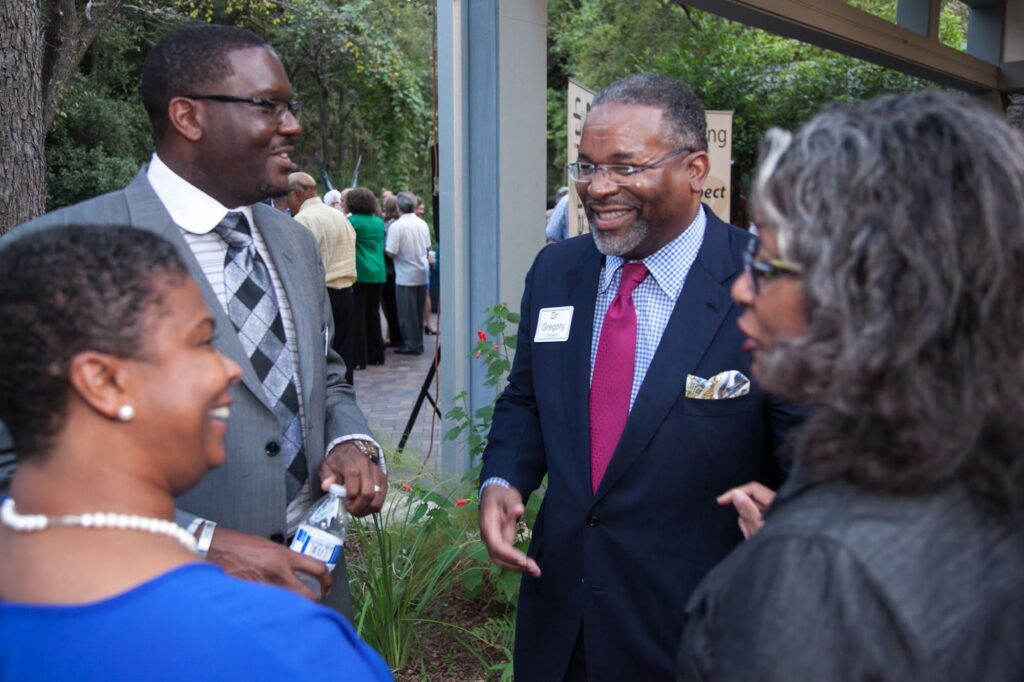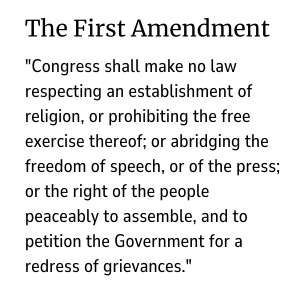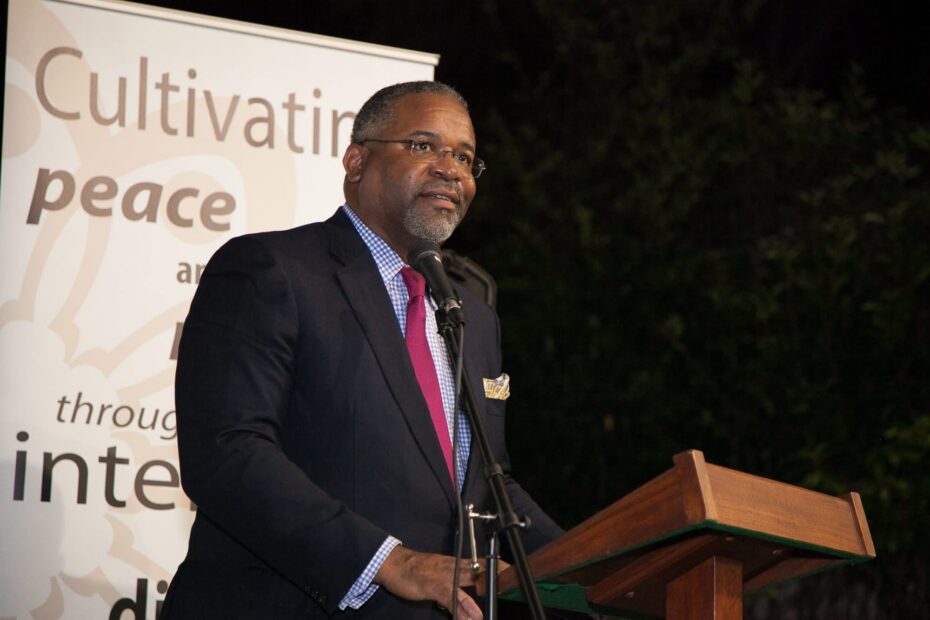December and January are meaningful celebratory months around the globe—whether celebrating Christmas, Hanukkah, Kwanza, Bodhi Day, Pancha Ganapati, Winter Solstice or the Lunar New Year, it is also a time of peace and reflection. In this spirit, Vincent Strategies is sharing a speech presented by Dr. Gregory J. Vincent during a special 2016 event “A Night Under One Sky” hosted by Interfaith Action of Central Texas (iACT). Although delivered eight years ago, the remarks are relevant today. The presentation serves as a reminder of interfaith traditions which are so important to Americans given the First Amendment protection for religious freedom.
Our Vincent Strategies team wishes everyone, no matter what their faith or belief, a joyous holiday season. Special thanks to Simone Flowers, iACT Executive Director, for allowing us to reprint the speech here. We would also like to thank Simone Flowers and her team at iACT for their continued, excellent work.
iACT – “A Night Under One Sky”
September 27, 2016
Umlauf Sculpture Garden, Austin, Texas
Remarks from Dr. Gregory J. Vincent
My name is Dr. Gregory J. Vincent. I am the vice president for Diversity and Community Engagement and W.K. Kellogg Professor at The University of Texas at Austin, but tonight I also speak to you as a Christian, Episcopalian, the current Chair and President of the Standing Committee of The Episcopal Diocese of Texas and former Senior Warden of St. James Episcopal Church.

I grew up in New York City, grandson to Caribbean immigrants and son to an amazing mother and father. My father, a first generation American, served in one of the last racially segregated units in the Army during the Korean War. Following the war, he used the GI Bill to earn a degree at the City College of New York and worked 35 years as an electrical engineer with General Electric and the New York City Transit Authority. My mother earned her master’s degree while also taking care of her elderly parents, raising three children and serving on our community school board for 13 years. When she was first elected in 1970, five years after the 1965 Voting Rights Act, she was only one of 1,400 African American elected officials in the country.
It wasn’t until I grew older that I understood how transformational my parents were. Growing up as a child I only knew them as mom and dad, the heads of state of our church home.
My parents, like my grandparents and great parents, were lifelong members of the Episcopal Church and the Anglican Communion. Our family’s home church for three generations is St. Philip’s Episcopal Church in Harlem and my upbringing relied heavily on that religious community. I never heard conflicting messages growing up. What I heard in church was what I heard at home and vice-versa. It was my religious community, one steeped in public service and social justice that taught me about the value of diversity in building community – and that selflessness is the key to making the greatest impact.
As I grew a bit older the Bronx Youth Ministry, where I served as president my senior year in high school, and St. Andrews Episcopal Church, where I taught Sunday School. contributed to my life of faith and to the development of my values that are carried with me today.
It was this upbringing that I mimic in raising my own children. I like to think that they too grew up in a church home. I am a proud member of St. James. Dedicated to diversity and fellowship, no matter your personal affiliation, our parish serves the underserved, and I believe is one of the most organically integrated congregations in all of Austin. I am most proud of our commitment to racial reconciliation, a process while not easy, is one which we continue to follow regardless of the many hurdles we face.
This past weekend I had the honor to attend the opening of the National Museum of African American History and Culture where I was reminded just how important the Black Church was in the growth and establishment of our nation, dating back to the late 1700s. It was Absalom Jones and Richard Allen that were two of the first African Americans licensed to preach by the Methodist Church. After facing segregation within the Methodist faith, Jones and Allen founded the Free African Society together to worship and to assist newly freed enslaved Caribbean and African people. Jones, who wished to remain within the Episcopal Church, was granted a petition to found the first African Episcopal Church of St. Thomas and would later become the first African American priest within the Episcopal Church in 1804. Allen, who wished to continue within the Methodist faith would split from Jones to found the African Methodist Episcopal Church. Together the two would serve as a foundation of the Black church in America.
The episcopal and AME faiths were highlighted throughout the museum, and it served to remind me of its historical significance, but also how important the work of the Black Church is today. Given recent tragedies such as those in Baton Rouge, Minneapolis, Orlando, Dallas, and Charleston, where nine African Americans were murdered by a White domestic terrorist during a prayer service at the Emanuel African Methodist Episcopal Church, the work of the St. James’, the AME Church, and the interfaith action councils, like iACT and others, is needed now more than ever. But sadly, it seems like our points of view, those of the classic church home, respect for others and love for thy neighbor have become the minority. In its place is more divisive rhetoric, some of it faith-based, built upon partisanship and malevolent sound bites. Although far from breaking news, tolerance in all its forms appears to be waning.
A country founded by immigrants and religious freedom is on the verge of takeover by those favoring walls, deportation, and religious tests. Actions designed to separate us based on differences, rather than connect us by our commonalities.
This is not to say that I disapprove of lively uncomfortable discussion. On the contrary, I believe it to be the lifeblood of any family. Our home is one where argument is the norm – but we debate the issues with respect for one another, working to understand our differing points of view. We do so out of love for one another. Different from much of the discourse viewed as permissible today.
Our nation was also founded through rigorous argument and debate. Though originated by Puritans who saw freedom of religion more so as freedom from English Protestant rule, America quickly became a land where one was free to worship by one’s own conscience. The purpose of this freedom was to allow us all to live freely – a Baptist living next to a Presbyterian living next to an agnostic and so on.
 Our forefathers rebuked the rules of heresy and religious persecution at a time when religious tolerance could equal death. And because of it, our Constitution makes no mention of God. It was to be us, the people, charged with forming a more perfect union. We are the ones to promote general welfare, establish justice, ensure domestic tranquility and provide for the common defense. And most famously, it is the first clause of the First Amendment which guarantees us all our religious freedom and free exercise thereof in essence prohibiting the governmental interference of our worship. Not to be forgotten is the lesser-known Article VI which states that no religious test shall ever be required as a qualification to any office or public trust – a clause of the Constitution which has received added attention this election cycle and for good reason.
Our forefathers rebuked the rules of heresy and religious persecution at a time when religious tolerance could equal death. And because of it, our Constitution makes no mention of God. It was to be us, the people, charged with forming a more perfect union. We are the ones to promote general welfare, establish justice, ensure domestic tranquility and provide for the common defense. And most famously, it is the first clause of the First Amendment which guarantees us all our religious freedom and free exercise thereof in essence prohibiting the governmental interference of our worship. Not to be forgotten is the lesser-known Article VI which states that no religious test shall ever be required as a qualification to any office or public trust – a clause of the Constitution which has received added attention this election cycle and for good reason.
Coming out of war and after centuries of English rule, where church and state were one in the same, it was the Founding Fathers who valued the power of individual reason and experience above all else. As Purdue University Professor of American colonial history Frank Lambert puts it in The Founding Fathers and the Place of Religion in America, the Founding Fathers believed true religion was not something handed down by a church but rather was to be found through free rational inquiry and the free marketplace of religion. State sponsored religion was itself a threat to the idea of religion.
It was future President James Madison who wrote of the alienable right to worship freely that “the religion then of every man must be left to the conviction and conscience of every man to exercise it as these may dictate.”
Similarly, it was Jefferson who listed the Virginia Act for Establishing Religious Freedom, which he presided over as governor, as one of three accomplishments included on his tombstone, omitting his presidency. After passing the bill, he proclaimed that the law protected, the Jew, the Gentile, the Christian, the Muslim, the Hindu, and the infidel of every denomination.
But much of this history is lost on large segments of our population in favor of the belief that the United States was founded as and remains inherently Christian. This is to say nothing of indigenous people who inhabited the continent for thousands of years, nor the African and Caribbean slaves who were docked unwillingly in our ports. But relies heavily upon our first Puritan settlers as having firmly established our nation as a Christian one. These causes have taken root today as immigrant fearmongering and assimilation demands, most prominent among self-professed nationalists. Less offensively, these points of view also exist among those advocating for government intervention to permit school prayer or the placement of the Ten Commandments on public lands. Neither of which I believe have a place in our public sphere and with good reason as they chill the exchange of ideas inherent to the Constitution.
That said, I have always struggled with the role of my religion in the public landscape, especially as a public servant of the State of Texas. As a religious man who has witnessed the transformational power of one’s relationship with God, I recognize the importance of my faith, but as a state employee I also understand the importance of secularism.
This all came to a head for me personally in 2000. Up until that point I had made the personal decision to keep my faith private and away from my public work. But it was that year that I had a lengthy and life-changing discussion with my uncle. My uncle served in the vestry with Thurgood Marshall at St. Philip’s – the church which I grew up in.
Most know Justice Marshall as the NAACP chief counsel in the landmark Brown v. Board of Education case that served to desegregate U.S. public schools or as our first Black Supreme Court Justice. But what I learned from my uncle was that Justice Marshall was also a man of great faith, not just privately, but also publicly.
I have since discovered that one of Justice Marshall’s most cherished awards, one that went unmentioned in his obituary, occurred the Sunday after Thanksgiving in 1962, the year I was born and baptized. While serving as a federal appeals court judge, Marshall returned to St. Philip’s to receive the Rector’s Award from the Reverend Dr. M. Moran Weston. For a man who accomplished so much in his career, the fact that he viewed this award with such reverence spoke volumes to me.
Although I was well versed in Marshall’s commitment to the faith – each year the Diocese of New York celebrates the anniversary of the Brown v. Board on May 17, as his feast day – I had always thought that Justice Marshall was devoutly secular in his professional life. But in fact, as my uncle shared, it was the exact opposite. His faith, and particularly his Episcopalian upbringing, undergirded his decision making, serving as the foundation of his advocacy for civil liberties.
Although I have not shared this story with many, quite simply, that talk changed my life. And from that point forward I made a promise to myself that I too would incorporate my faith into my public life.
Coming out of that discussion with my uncle, I realized that I had for too long naively equated one’s faith with bias or discrimination. But then I thought about my upbringing in the Black Church. Although firstly dedicated to God, it was that dedication which fueled the church’s defense of social justice. The golden rule, “love thy neighbor” and other Christian tenets were all axioms that were also inherent to my work in higher education. It was Dr. King’s relationship with God which instructed his civil disobedience and nonviolent crusade to end state sponsored discrimination. Although less public, as I learned it was a similar relationship which led Justice Marshall to take the cause of 20 children from Topeka, Kansas, to the Supreme Court.
When I thought further, it was clear that Christian teachings and my love of God had not only informed my thinking, but had also led me, even if I hadn’t fully realized it, through my professional career. I had just failed to acknowledge it publicly. From assistant attorney general fighting for equal rights and opportunity, to leading the Ohio Civil Rights Commission and then transitioning to higher ed, where I have dedicated the last two decades toward creating access and equity for all students. My Christian ideals, rooted in my church home, have dictated all I have done. I have always fought for justice; it’s just been more recently that I have become more comfortable to discuss it as it relates to my beliefs as a Christian.
So, am I talking out of both sides of my mouth? Speaking on the religious freedoms of our nation while simultaneously discussing the importance of incorporating my faith into my work life. I will allow each of you to decide for yourselves, but I will say that personally my more recent public acceptance of the role of God and my relationship with Him has only served to further cement my support for religious freedoms. I have settled that there is a difference between one’s personal faith and the state sponsorship of religion. I’ve also realized that the Christian tenets upon which I rely are universal. While my relationship with God is unique to my individual faith, the teachings are not. They are the moral base for which the Founding Fathers built this nation. I have no reason to hide them. They deserve to be celebrated.
Eleven years before he assisted in the writing of the Declaration of Independence, Thomas Jefferson purchased a Qur’an. At the time of its purchase, America was inherently anti-Islamic. The faith was condemned across Europe after centuries of negative stereotypes, not all that dissimilar from what is happening today. Yet Jefferson and other framers refused to exclude their existence even though other than some West African slaves, there were likely no practicing Muslims in the United States in 1787. Instead, they authored a constitution which envisioned their theoretical inclusion as full citizens and possible office holders. Although it would not occur for another hundred years, this was the first step toward ensuring that all people could become future citizens of the United States of America.
That’s the story of our founding, that the exclusion of any religion, was the exclusion of all religion. Whether we choose to be more public or more private with our faith, I urge all of you to continue spreading the word of tolerance and understanding that we all so strongly believe in. That message has never been more important. Let us be united in standing up for what we believe in as we all collectively work to build relationships across our many divides.
Thank you for your time and may God bless all of us this evening.

